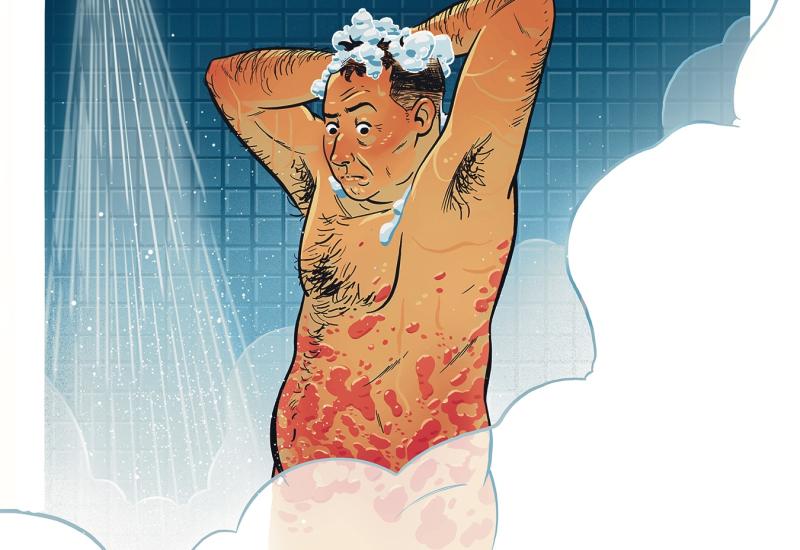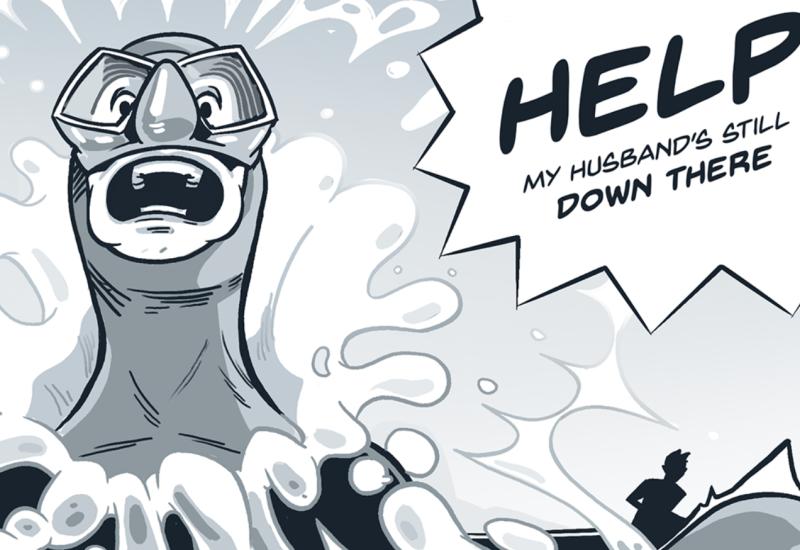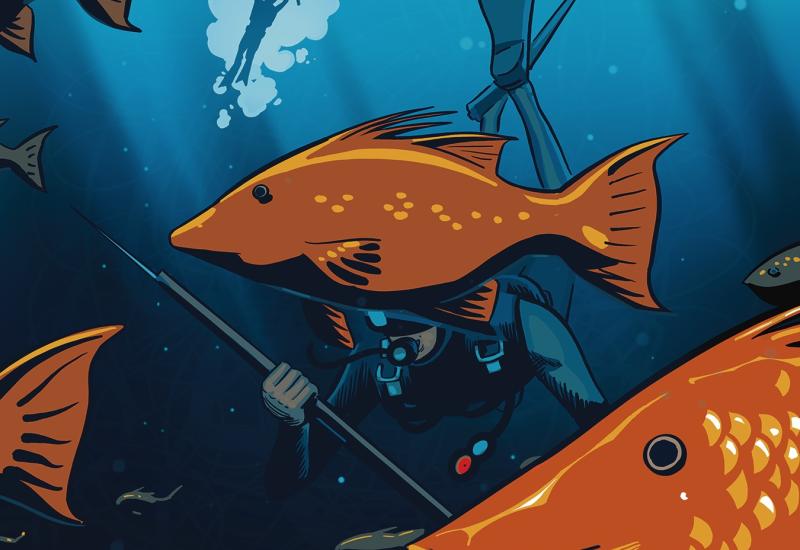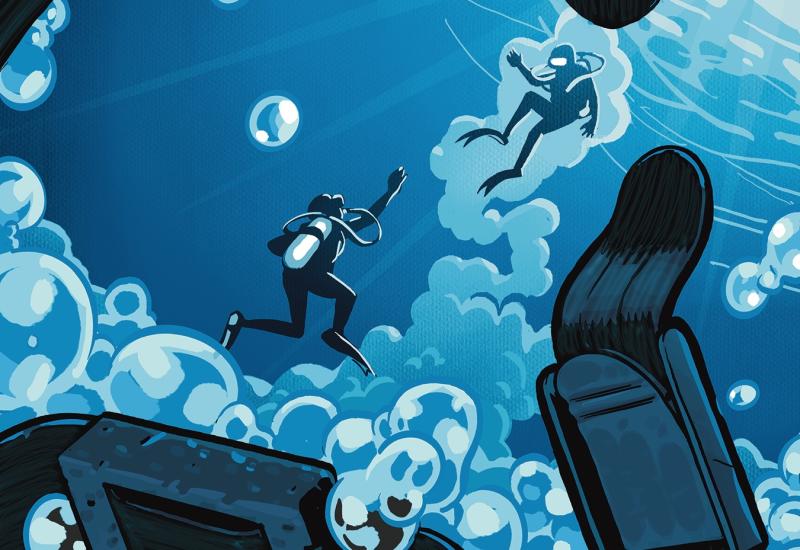Self-Proclaimed Expert

Photograph by Tanya Burnett & Kevin Palmer
Jason started to gasp, his breaths growing shallower as he struggled to push three scuba tanks through the water and the current continued to carry him away from the boat. Surfacing, he spit out his regulator and tried to yell for the boat, but he couldn't keep his head above the water. Struggling back to the surface, he coughed and choked up water, locating his regulator and replacing it just before he slipped underwater again. He tried again to inflate his BC, holding the button down, but still he couldn't seem to keep his head above the surface. Sticking his arms up, he waved. That's when the shooting pain ran up into his neck and down his left arm, and he knew he was going to die.
The Diver
Jason was an experienced recreational diver in his mid-40s, about 40 pounds overweight, and he participated in no routine cardiovascular exercise. Over the years, he had accumulated a wallet full of recreational specialty cards--and an ego to go with them. Convinced that he was an expert diver, he signed up for a technical diving course, but after a two-hour pool session, and one dive to only 75 feet, the instructor refused to allow him to continue training. Citing a number of academic and water-skill deficiencies, especially in the areas of buoyancy control and situational awareness, the instructor assigned Jason remedial reading and a number of water exercises. He told Jason that as soon as he mastered those skills he could resume training. Ignoring this advice, Jason located another instructor in a dive destination halfway around the world and signed up for the same courses.
The Dive
Jason reported to the overseas dive shop, completed some academic review with his new instructor and picked up his tanks--twin cylinders he would wear on his back and a smaller decompression cylinder that he would wear under one arm--in advance of the first training dive the following morning.
The sea conditions were calm with a slight to moderate current in 100 feet of clear, warm water. The captain gave a brief description of the dive site, and then Jason's instructor gave him a lengthy briefing on the skills to be completed and the procedures to be followed.
The Accident
The divers entered the water from the bow of the boat. As instructed, Jason grabbed the line and tried to begin his ascent, but he was unable to properly deflate his BC and struggled for several minutes on the surface until his instructor finally assisted him in dumping air. Then, the dive turned from bad to worse.
Unable to locate his inflator to slow his descent, Jason began plummeting to the bottom. He soon lost all control and ended up "turtled" on his back with his tanks firmly imbedded in the bottom and his feet sticking straight up in the air. In this face-up position, Jason found his regulator very hard to breathe from, and he choked on trickles of water that came in with every breath. When his instructor reached him, Jason was in full-scale panic, and he irrationally lashed out, ripping away the instructor's regulator and dislodging his mask. When the instructor backed away to clear his mask and regain control of the situation, Jason located his inflator, depressed the inflate button and held it all the way back to the surface. Somehow, he managed to avoid an embolism and DCS; however, he surfaced well down current of the boat.
Still in a state of panic, Jason found it hard to keep his head above water even though his BC was fully inflated, and he struggled to swim against the current. After several minutes of trying to yell for help and make it back to the boat, the stress and anxiety overwhelmed his poorly conditioned cardiovascular system.
The Recovery
Jason's instructor and the alert boat captain reached him about the same time. They stripped him out of his gear and began administering oxygen. They transported Jason to a local medical facility where it was determined that he had suffered a minor heart attack.
Analysis
We will never know whether Jason would have had heart problems if he had not been in such distress during the dive, but it is apparent that his poor level of fitness contributed to his injuries.
A review of Jason's equipment revealed that his buoyancy compensator was more than adequate for the amount of weight he carried, but he overinflated the BC. When a back-mounted BC is too large for the equipment package and overinflated, it has a tendency either to push the diver over onto his back or face-down into the water. In Jason's case, his position was forcing him face-down. Had he been more familiar with his equipment, he would have realized that deflating the BC by about 30 percent would have put him floating in a secure upright position.
Lessons for Life
Develop your skills in controlled conditions before jumping into open water, and be wary of advanced diving courses that do not require a full skills evaluation before open-water dives.
The more complicated the dive, the more complicated the equipment and the more important it is to be fully familiar with your gear.
Stay in shape or get in shape for diving. You need physical endurance and conditioning levels that far exceed the actual planned requirements of any dive.
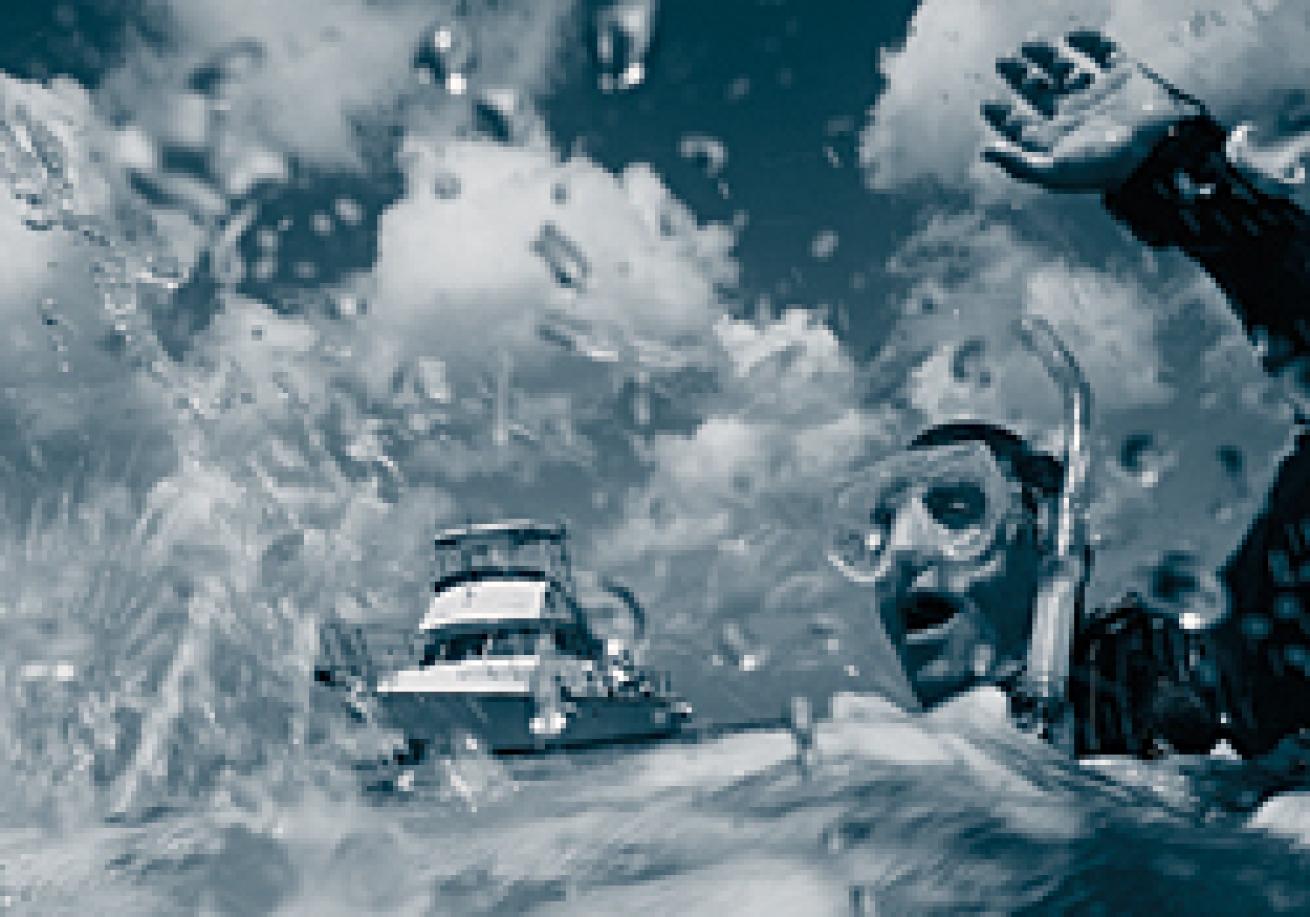
Photograph by Tanya Burnett & Kevin Palmer
Jason started to gasp, his breaths growing shallower as he struggled to push three scuba tanks through the water and the current continued to carry him away from the boat. Surfacing, he spit out his regulator and tried to yell for the boat, but he couldn't keep his head above the water. Struggling back to the surface, he coughed and choked up water, locating his regulator and replacing it just before he slipped underwater again. He tried again to inflate his BC, holding the button down, but still he couldn't seem to keep his head above the surface. Sticking his arms up, he waved. That's when the shooting pain ran up into his neck and down his left arm, and he knew he was going to die.
The Diver
Jason was an experienced recreational diver in his mid-40s, about 40 pounds overweight, and he participated in no routine cardiovascular exercise. Over the years, he had accumulated a wallet full of recreational specialty cards--and an ego to go with them. Convinced that he was an expert diver, he signed up for a technical diving course, but after a two-hour pool session, and one dive to only 75 feet, the instructor refused to allow him to continue training. Citing a number of academic and water-skill deficiencies, especially in the areas of buoyancy control and situational awareness, the instructor assigned Jason remedial reading and a number of water exercises. He told Jason that as soon as he mastered those skills he could resume training. Ignoring this advice, Jason located another instructor in a dive destination halfway around the world and signed up for the same courses.
The Dive
Jason reported to the overseas dive shop, completed some academic review with his new instructor and picked up his tanks--twin cylinders he would wear on his back and a smaller decompression cylinder that he would wear under one arm--in advance of the first training dive the following morning.
The sea conditions were calm with a slight to moderate current in 100 feet of clear, warm water. The captain gave a brief description of the dive site, and then Jason's instructor gave him a lengthy briefing on the skills to be completed and the procedures to be followed.
The Accident
The divers entered the water from the bow of the boat. As instructed, Jason grabbed the line and tried to begin his ascent, but he was unable to properly deflate his BC and struggled for several minutes on the surface until his instructor finally assisted him in dumping air. Then, the dive turned from bad to worse.
Unable to locate his inflator to slow his descent, Jason began plummeting to the bottom. He soon lost all control and ended up "turtled" on his back with his tanks firmly imbedded in the bottom and his feet sticking straight up in the air. In this face-up position, Jason found his regulator very hard to breathe from, and he choked on trickles of water that came in with every breath. When his instructor reached him, Jason was in full-scale panic, and he irrationally lashed out, ripping away the instructor's regulator and dislodging his mask. When the instructor backed away to clear his mask and regain control of the situation, Jason located his inflator, depressed the inflate button and held it all the way back to the surface. Somehow, he managed to avoid an embolism and DCS; however, he surfaced well down current of the boat.
Still in a state of panic, Jason found it hard to keep his head above water even though his BC was fully inflated, and he struggled to swim against the current. After several minutes of trying to yell for help and make it back to the boat, the stress and anxiety overwhelmed his poorly conditioned cardiovascular system.
The Recovery
Jason's instructor and the alert boat captain reached him about the same time. They stripped him out of his gear and began administering oxygen. They transported Jason to a local medical facility where it was determined that he had suffered a minor heart attack.
Analysis
We will never know whether Jason would have had heart problems if he had not been in such distress during the dive, but it is apparent that his poor level of fitness contributed to his injuries.
A review of Jason's equipment revealed that his buoyancy compensator was more than adequate for the amount of weight he carried, but he overinflated the BC. When a back-mounted BC is too large for the equipment package and overinflated, it has a tendency either to push the diver over onto his back or face-down into the water. In Jason's case, his position was forcing him face-down. Had he been more familiar with his equipment, he would have realized that deflating the BC by about 30 percent would have put him floating in a secure upright position.
Lessons for Life
Develop your skills in controlled conditions before jumping into open water, and be wary of advanced diving courses that do not require a full skills evaluation before open-water dives.
The more complicated the dive, the more complicated the equipment and the more important it is to be fully familiar with your gear.
Stay in shape or get in shape for diving. You need physical endurance and conditioning levels that far exceed the actual planned requirements of any dive.

